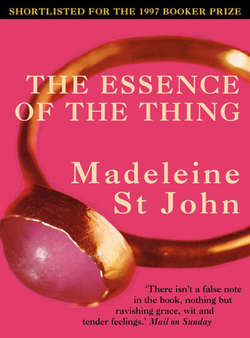Читать книгу The Essence of the Thing - Madeleine John St. - Страница 5
1
ОглавлениеNicola was still standing in the doorway when Jonathan began to speak: she hadn’t had time even to take off her coat. It was a cold spring evening: one still needed a coat out of doors after dark.
She was standing there in the sitting-room doorway, her hands in her pockets, holding on to the packet of cigarettes she had gone out to buy, and the loose change, and the keys; she hadn’t had time even to put these things on the table, and take off her coat, and sit down, because Jonathan had called out to her as soon as she’d shut the front door behind her. ‘Nicola?’ But in a tone of voice which seemed odd to her: too sharp, too urgent: and she’d stood, perplexed, in the doorway, her fingers having suddenly tightened around the cigarettes, the keys, the loose coins: ‘What is it?’ she said. Is something wrong?
Jonathan was sitting at the far end of the sofa; he turned his head just enough to enable his eye to catch hers. He gazed at her for a moment and then he spoke again. ‘Come in here,’ he said. ‘I want to talk to you.’
What was he saying? Nicola was paralysed by dread – a dread which in weaker doses had become almost familiar to her during the past few months: now, with this preposterous invitation, Come in here (for where else might she have gone?), this ominous announcement, I want to talk to you, she saw that something wholly dreadful had at last begun. She saw this, but part of her mind failed truly to grasp it. So she stood, dumbfounded, in the doorway. ‘What is it?’ she asked again. ‘What’s wrong?’
Wrong is one of those words which sound like what they signify, not by virtue of onomatopoeia, but by virtue of a more subtle correspondence: the same being true, to a lesser degree only, of right. There is right and there is wrong: the knowledge that there is right and wrong is part of one’s English-speaking birthright: these attributes could not imaginably achieve the same terrible finality in another formulation. This is right, said the Anglo-Saxon warrior, and that is wrong. And to be in the wrong is to be cast into a waste of ice and darkness which is the ultima Thule of devastation. One might nevermore return. ‘Is anything wrong?’ She could see as she uttered the word that something was, indeed, wrong. The ice and darkness filled the room.
Jonathan shrugged very slightly and then got impatiently to his feet. He leaned an arm against the mantelpiece; if there had been a fire he would certainly have poked it. As it was, he looked unseeingly at the objects at his elbow and moved a china poodle dog. Then he looked up at her again. ‘There’s no nice way to say this,’ he said. ‘But I’ve decided – that is, I’ve come to the conclusion – that we should part.’ The ice and darkness were now inside her: all her entrails froze.
‘I think I’ll sit down,’ she said. Her entrails had frozen, but her ankles had turned to water. She walked unsteadily over to the sofa and sat down, huddling her coat closer around her. Her hands were still in the pockets, still holding on to the cigarettes, and the loose change, and the keys. She dared not look at him, and yet she knew she must. She saw that Jonathan’s face was a perfectly composed mask of calm assurance.
There was still a part of Nicola’s mind which did not believe that this conversation was really taking place, and so it was possible to enter further into it. It was a sort of joke, it was the sort of joke which might be perpetrated in a dream: in the alternative reality where there was no right, no wrong. There’s nothing wrong, she found herself thinking: this is just a sort of joke which I haven’t yet understood. ‘I don’t think I understand,’ she said. ‘Could you just say all that again?’
